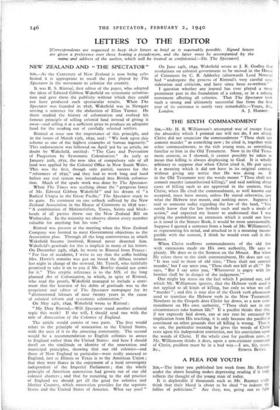THE SIXTH COMMANDMENT
S/R,—Mr. H. R. Williamson's attempted way of escape from the absurdity which I pointed out will not do, I am afraid. Christ did not enunciate the commandment "Thou shalt not commit murder" as something new ; he cited it, together with other commandments, to the rich young man, as something familiar to him in the Old Testament. Now in its Old Testa- ment context, as I showed, it cannot possibly be taken to mean that killing is always displeasing to God. It is wholly arbitrary to suppose that when Christ cited it, He put upon it a meaning which it did not have in its original context, without giving any notice that He was doing so. If in the Old Testament text the words meant "Thou shalt not commit murder (unauthorised killing)," and said nothing about cases of killing such as are approved in the context, then Christ, when He cited the commandment, as well known and accepted, must have meant, unless He stated otherwise, just what the Hebrew text meant, and nothing more. Suppose I said to someone today regarding the law of the land, "You surely know that the law forbids such and such a mode of action," and expected my hearer to understand that I was giving the prohibition an extension which it could not have as it stood in the Statute Book, it would be most unreasonable. Suppose I quoted a sentence from a book of Mr. Williamson's, as representing his mind, and attached to it a meaning incom- patible with the context, I think he would even call it dis- honest.
When Christ reaffirms commandments of the old law with extensions made on His own authority, He says so plainly. He does so in the Sermon on the Mount. But when He refers there to the sixth commandment, He does not say, "It was said to them of old time, 'Thou shalt not commit murder,' but I say unto you, 'Thou shalt not kill at all.' " He says, "But I say unto you, 'Whosoever is angry with his brother shall be in danger of the judgement.' " One might lay stress on the fact which I pointed out, and which Mr. Williamson ignores, that the Hebrew verb used is not applied to all kinds of killing, but only to what we call " murder " ; and this is true also of the Greek verb phoneuein used to translate the Hebrew verb in the New Testament. Nowhere in the Gospels does Christ lay down, as a new com- mandment on His own authority, "Thou shalt not in any circumstances take human life." If a pacifist thinks that this, if not expressly laid down, can at any rate- be extracted by implication from His teaching, it is only because the pacifist is convinced on other grounds that all killing is wrong. That is to say, the particular meaning he gives the words of Christ rests upon his independent conviction, not his conviction upon the words of Christ. If the whole case for pacifism rests, as Mr. Williamson thinks it does, upon a non-existent command of Christ, pacifism must be in a bad why.-1 am, Sir, yours, EDWYN BEVAN.






































 Previous page
Previous page